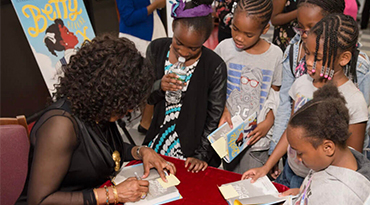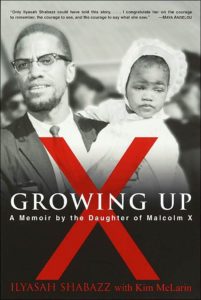What Growing Up X Taught Ilyasah Shabazz About Feminism

By: Lisa Niver
SOURCE: Ms Magazine
Ilyasah Shabazz wasn’t yet three years old when her father, Malcolm X, was gunned down in 1965 in front of his wife, young daughters and supporters. Yet the story of her life Shabazz told in her memoir, Growing Up X, ended with words of resolve and optimism.
“Life is not a destination,” she wrote. “It is a journey. Faith makes everything possible. In order to succeed in life, we must first believe that we can.”
 In the coming-of-age memoir, Shabazz explained that her father “dedicated his life to opening the eyes of black Americans to their own worth,” calling “this re-liberation from the self-loathing branded into our souls by four hundred years of slavery, racism and oppression” her father’s “greatest gift to his people.”
In the coming-of-age memoir, Shabazz explained that her father “dedicated his life to opening the eyes of black Americans to their own worth,” calling “this re-liberation from the self-loathing branded into our souls by four hundred years of slavery, racism and oppression” her father’s “greatest gift to his people.”
Shabazz was raised in the aftermath of her father’s death by her mother, Dr. Betty Shabazz, in a small but supportive community. In an interview, she opened up about “the importance of self-love” that she and her sisters learned from Betty.
“If you don’t love yourself, you cannot fully love others,” she explained, “let alone care for others. My sisters and I learned about the importance of one’s identity. We learned about the significant contributions that Africa and its Diaspora gave to the world. We learned about the significant contributions of Islam and of women. We learned that each of us is a reflection of one another. When we saw any form of unfairness, we were for the most part compassionate and cared enough to want to help out.”
In Shabazz’s middle school historical fiction book, Betty Before X, she writes that her mother learned at a young age about self-acceptance, compassion and activism. She describes her mother as a “devoted wife, a selfless mother, a compassionate friend, a bold activist and most importantly a caring human being who lived her life with integrity and grace.”
With Betty as her mother, Ilyasah learned the importance of helping others and yourself. “It is not falling that defines you,” she writes in Betty Before X. “It’s the process of what you ‘muster’ deep within yourself, the self-discovery and determination to stand each time you fall that builds tremendous character.”
Shabazz’s parents also raised her as a feminist. At the beginning of Betty Before X, Shabazz declares that “a society is measured by the progress of its women.” It’s a lesson she learned at home. “My father said: ‘When you educate a boy, you teach a community; when you educate a girl, you raise a nation.’” Shabazz also dedicated Betty Before X to her mother because of her “belief in the potential of every single girl.”
Shabazz’s parents knew that education was a critical part of that potential. Their six daughters went to private schools and spent summers at a camp in Vermont steeped in Quaker and Native American values. They participated in music and dance lessons. They attended tutorials in Islam and the history of the African Diaspora.
“Education is an important element in the struggle for human rights,” Shabazz quotes her father as saying in Growing Up X. “It is the means to help our children and our people rediscover their identity and thereby increase self-respect. Education is our passport to the future and tomorrow belongs to those who prepare for it today.” Shabazz took the message to heart: she’s an adjunct professor at John Jay College of Criminal Justice and has taught classes there including Race, Class and Gender in Corrections, Institutional Law and American Cultural Pluralism and Law.
Shabazz has also written several books aiming to empower young people to self-actualization, furthering the mission her father embarked on and devoted his life to. Fittingly, she is also a trustee for both the Malcolm X and Dr. Betty Shabazz Memorial and Educational Center and the Malcolm X Foundation.
“Being the daughter of Malcolm X and Dr. Betty Shabazz is a gift for which I am forever grateful,” she writes in Growing Up X. “Malcolm X was a man absolutely committed to changing the way people of African descent viewed themselves, one another and their place in world history. He attempted to resolve the psychological scars and racial barriers that kept a people from reaching its full potential. He gave African Americans one of the greatest gifts possible, the gift of self-respect. He is my hero and my mother is my heroine. I wouldn’t change that for anything. Because of them, I know true love. I am a product of love.”
But being the daughter of Malcolm X also meant living a private life with public expectation—something Shabazz explores in her memoir, calling out “how deeply and sadly Malcolm X is misunderstood in American today, and how that misunderstanding often casts its shadow on my sisters and myself.”
Many African-American students at Shabazz’s college, for example, assumed that she would be a “firebrand” who wanted to live in the W. E. B. Du Bois house and be the chairperson of the black student union. In fact, they moved her to that dorm, nominated her as chair and wrote her speech to make it happen.
“I remember always wanting to have the fire,” she told me. “I wanted to be a passionate speaker. I wanted to be able to walk onto a stage and deliver whatever it is that people wanted. I wanted to please and meet people’s expectations. They expected me to be my father. People wanted me to come on stage and deliver what my father delivered. I felt the disappointment and disillusionment when I was in college. I decided to focus on my own perspective and experience. I saw people speaking from anger or discontentment and I realized that wasn’t me, I did not have that. Instead of living for others, I began living for myself, and that has made it much easier to find my own voice. I could not to be what others wanted me to be, but I could be what I thought God would want me to be—just who I am.”
Shabazz today encourages her students to “teach the class which helps them find their passions, their voices and acceptance within themselves.” She’s interested not in molding them to fit someone else’s ideas, but in giving them the help they need to find their own way.
“When you are unsure of yourself, you miss out on opportunities because you are quiet,” she explained to me. “You don’t raise your hand and ask questions. You’re removed from the discussion, from an opportunity to learn and to engage others. You need to accept who you are and love who you are and share that with the world.”
ABOUT LISA NIVER
Lisa Ellen Niver is an award-winning travel expert who has explored 101 countries and six continents. Her website, We Said Go Travel, was read in 212 countries in 2018. Find her talking travel on KTLA TV and her YouTube videos with nearly one million views. Lisa has written for AARP, American Airways, Jewish Journal, Ms. Magazine, Smithsonian and Wharton Magazine. She is writing a book, “Brave Rebel: 50 Adventures Before 50,” about her most recent travels and challenges. Look for her underwater SCUBA diving, in her art studio making ceramics or helping people find their next dream trip.
Ilyasah Shabazz

Leave a Reply
You must be logged in to post a comment.